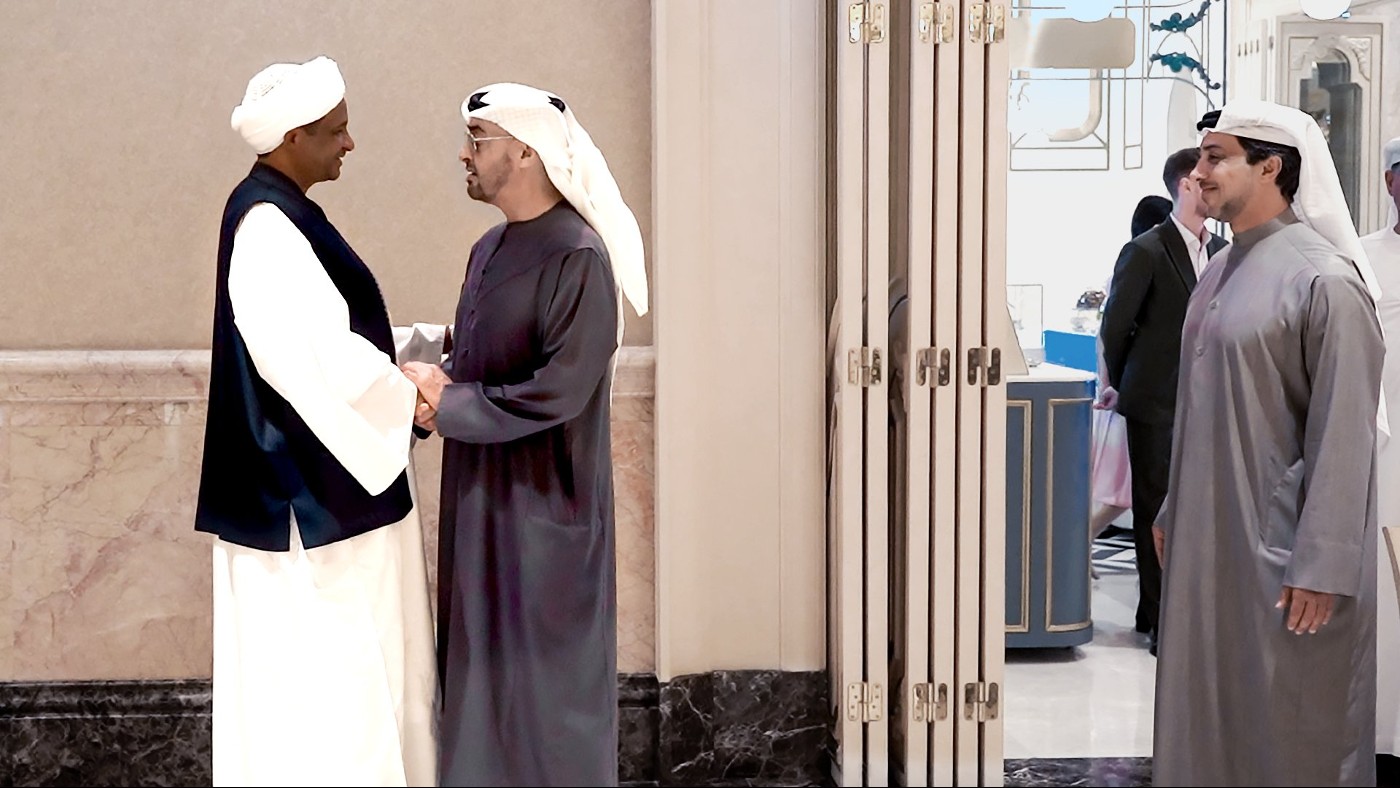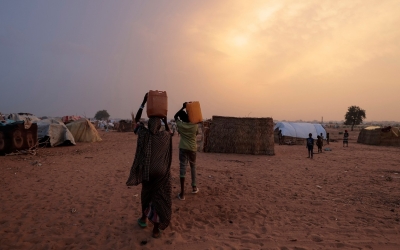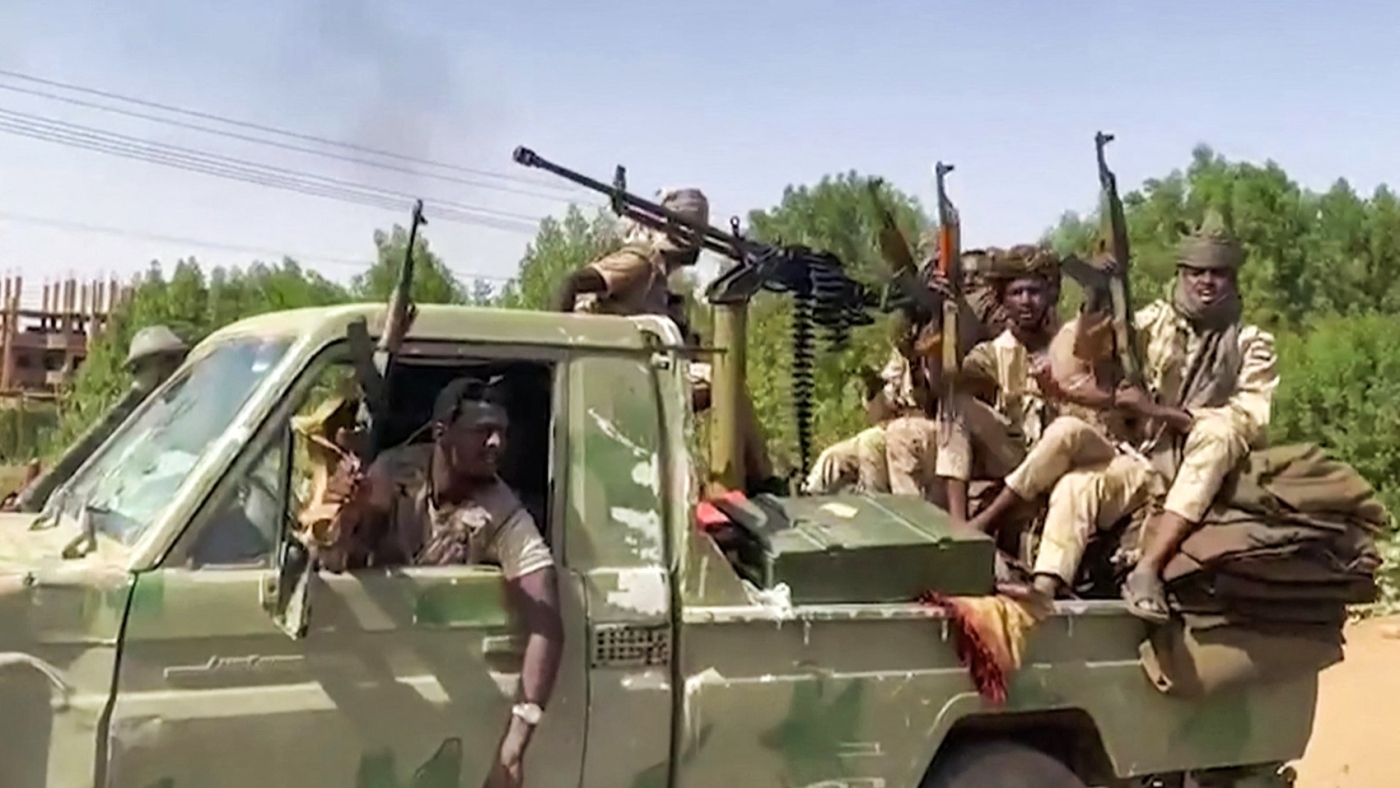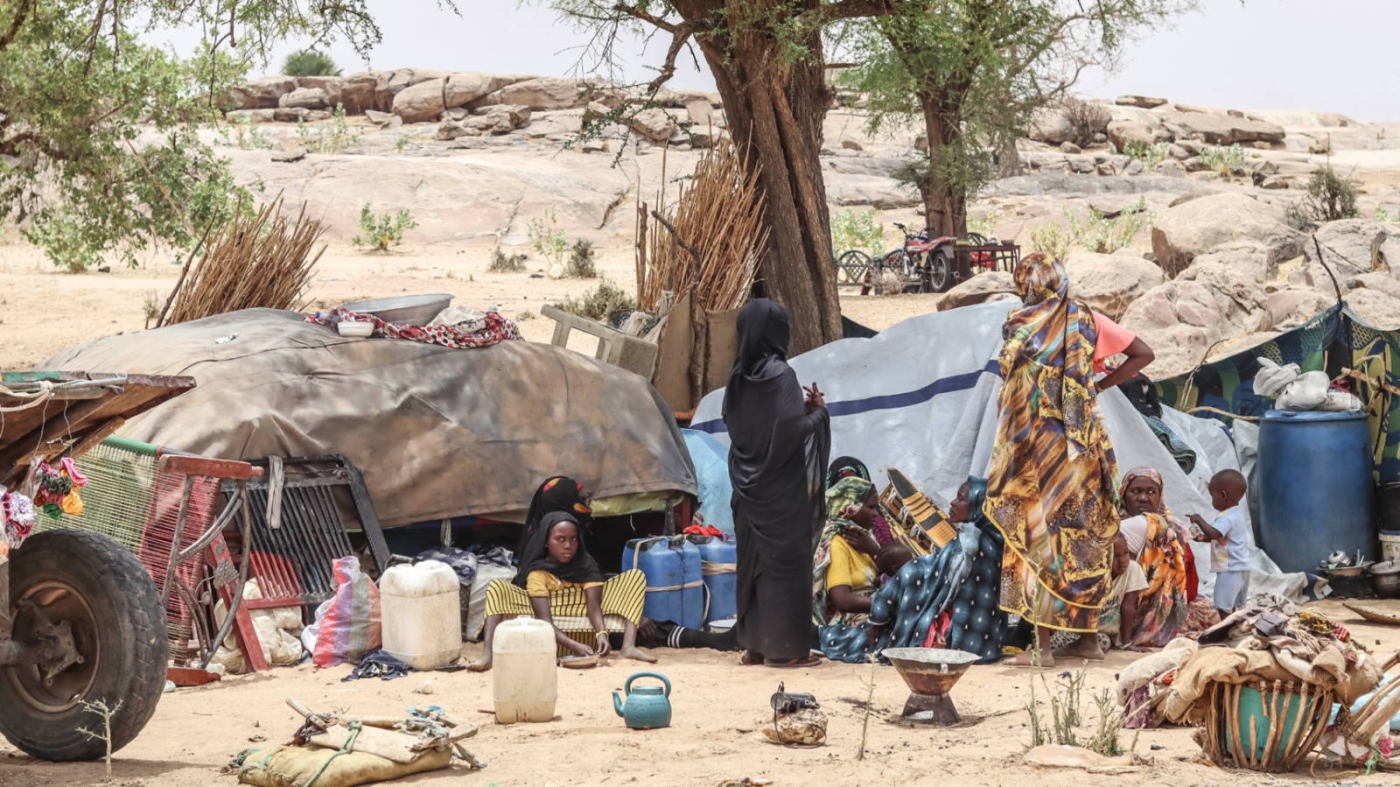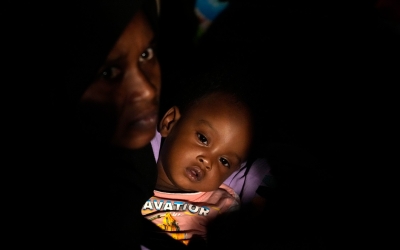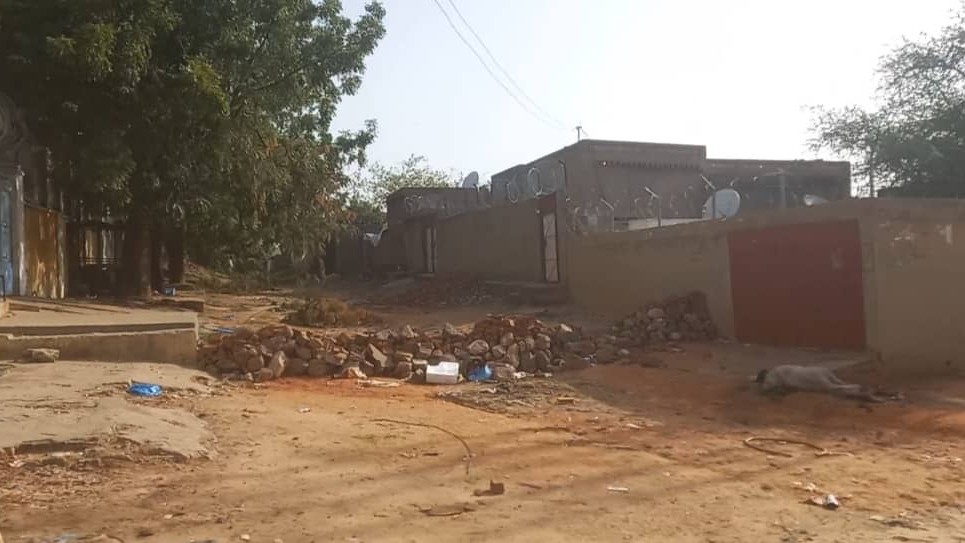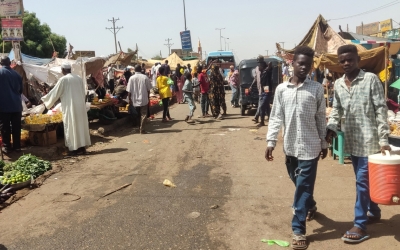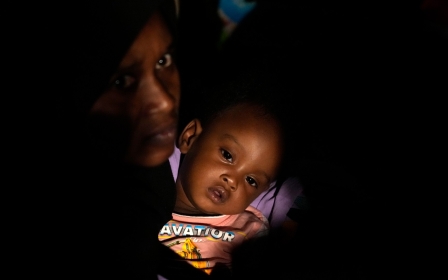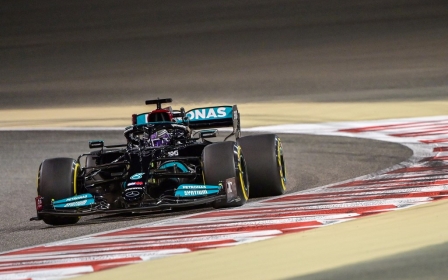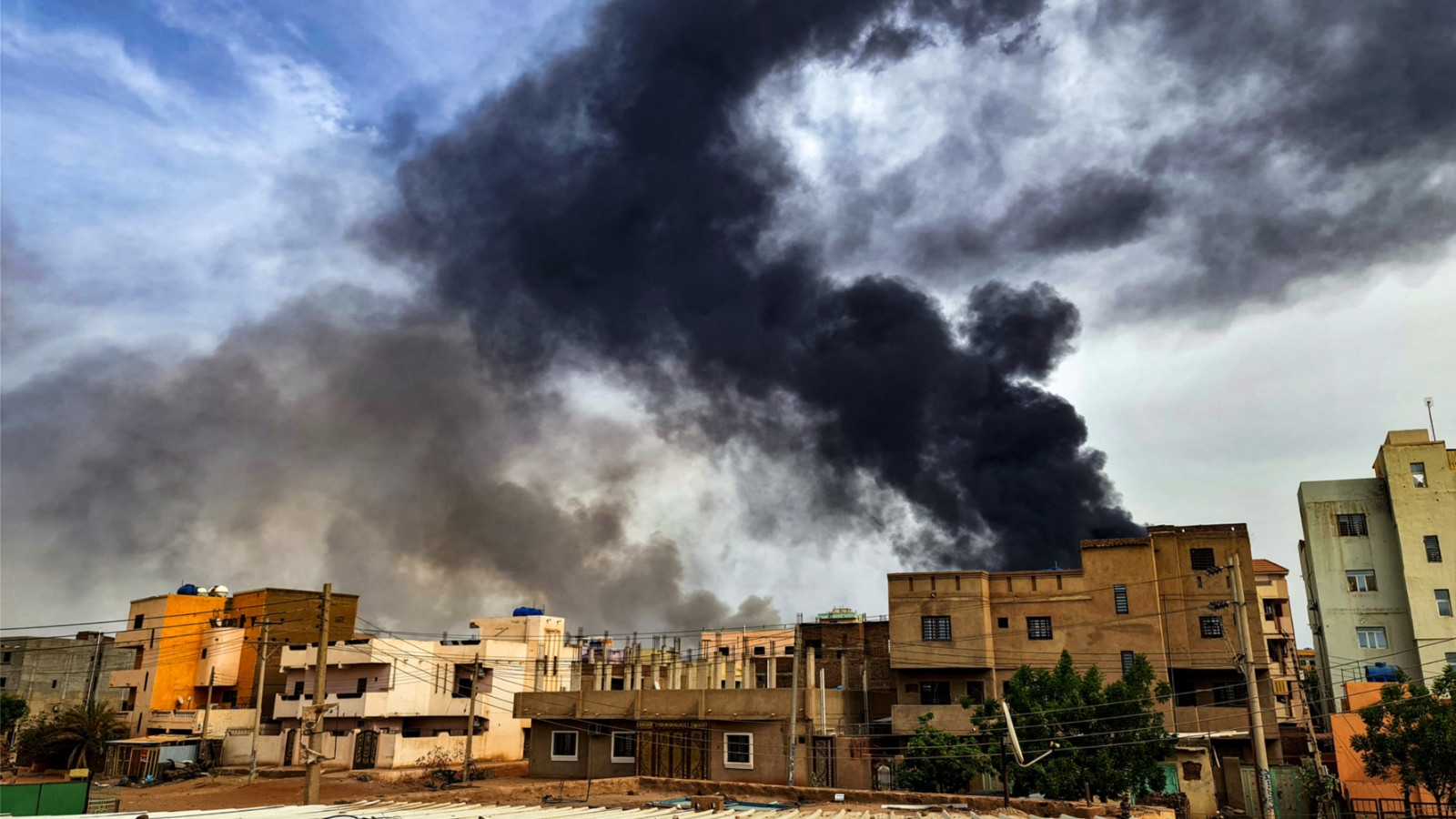
How the UAE kept the Sudan war raging
At midday on 6 August last year, a plane carrying unknown cargo could be seen on the runway at Hamrat al-Sheikh, an airstrip in Sudan’s North Kordofan state. A handful of local people gathered around it. One of them took a video.
Hamrat al-Sheikh is a remote but strategically important site. It’s 250km from el-Obeid, the capital of North Kordofan, which for several months has been besieged by the paramilitary Rapid Support Forces (RSF) in its nine-month war with the Sudanese army.
The town, which in peace-time has a population of more than 400,000, is also at a key intersection of several roads, linking the RSF’s power base in western Sudan’s Darfur with Khartoum.
Details taken from that airstrip video and verified by Middle East Eye, as well as information from flight trackers Flightradar24 and JetPhotos, indicate that the ordinary-looking plane at Hamrat al-Sheikh was a white Beechcraft 1900D with a blue tail and owned by Bar Aviation, a company based in Uganda. The company did not respond to questions from MEE by the time of publication.
News of the landing spread to el-Obeid, two sources in the town told Middle East Eye. The reason was clear, one of the sources said: the plane's cargo contained weaponry - possibly Russian Katyusha rockets - destined for the RSF, which has been using the artillery in the area, as it has across the country.
New MEE newsletter: Jerusalem Dispatch
Sign up to get the latest insights and analysis on Israel-Palestine, alongside Turkey Unpacked and other MEE newsletters
The munitions would support the group's hold on el-Obeid as well as its attempts to control the supply lines running from Darfur to Khartoum.
Another source said that the rockets had been used to fire on North Kordofan’s Centre of Peace and Development Studies (a photo seen by MEE showed the building half-destroyed).
According to multiple sources, both local and international, the plane originated from the UAE. The UAE has previously denied “supplying weapons or ammunition to any of the warring factions in Sudan”.
But the supply of weapons to the RSF has allowed it to punch above its weight, in a complex network of supply lines and alliances that encompasses not only Sudan but also Libya, Chad and Uganda.
The revival of the RSF
The war in Sudan has now been going on for more than nine months. According to the UN, the conflict has displaced 7.3m people and killed more than 12,000. The numbers go up day by day. Death tolls in Darfur are largely unrecorded: the real figure is probably far higher. Both sides have committed atrocities.
The army has revitalised the prospects for ultra-conservative groups and figures connected to the autocratic administration of former president Omar al-Bashir, who was removed from power after three decades following a popular uprising in 2019.
In Darfur, which has been in an almost permanent state of conflict throughout the 21st century, eyewitnesses have told Middle East Eye of summary executions, rape, and ethnically motivated killings perpetuated by the RSF and its allied Arab militias, targeting the Black African Masalit population. These crimes, denied by the paramilitary, have been recorded by human rights groups.
In December, the RSF seized control of Sudan’s second city, the previously peaceful Wad Madani, which was hosting hundreds of thousands of displaced civilians.
'What is coming from the UAE is very substantial. It has kept the RSF in the fight'
- Cameron Hudson, former CIA analyst
The army had beat a hasty retreat, offering little to no resistance and leaving those civilians at the mercy of the paramilitary group. Riven by internal splits, the army now says it will investigate its decision to withdraw after rank-and-file soldiers accused its leadership of betrayal.
On the battlefield and in the diplomatic arena, the RSF, which was brought into the Sudanese state under the auspices of the intelligence services in 2013, following a series of protests that threatened Bashir, is now in the ascendency.
When fighting began in Khartoum last April, there was a feeling among many inside and outside Sudan that the SAF’s greater numbers, its air power, status as the national army, and its control of the country’s institutions would eventually see it overcome its ally-turned-enemy.
Although the RSF only has about 100,000 men compared to the army’s estimated 200,000, it has been battle-hardened by crushing dissent across Sudan, and fighting for UAE-backed forces in Yemen, Libya and other parts of the Sahel region, making it the more effective outfit. But while the paramilitary force was able to take weapons and equipment from the army, it would need more than that to keep it properly supplied.
Cameron Hudson, a former CIA analyst and senior associate at the CSIS Africa Program, told MEE: “At the beginning of the conflict, I and others were saying it will be difficult for the RSF to sustain. And yet we have all been proven wrong and I think the difference maker has been external support.
"I think what is coming from the UAE is very substantial. It has kept them in the fight, and it has allowed them to sustain this fight with no end in sight.”
Sudanese and western officials, diplomats, local activists and human rights lawyers have all echoed Hudson's view.
The support has come primarily from one place, a key US ally: the UAE.
It was also, according to the US government, facilitated by the private Russian military group Wagner, which “has been supplying the Rapid Support Forces with surface-to-air missiles to fight against Sudan’s army, contributing to a prolonged armed conflict that only results in further chaos in the region."
Mohamed Hamdan Dagalo, the leader of the RSF better known as Hemeti, has headquartered his commercial empire in Dubai, one of the emirates. He is reportedly close to the UAE’s vice president, Mansour bin Zayed, and took a long trip to Abu Dhabi last February and March, before the war began, meeting with Sheikh Mansour and the UAE’s president and ruler, Mohammed bin Zayed.
The gold that flows out of RSF-controlled mines in Darfur is traded in the UAE, where Hemeti’s youngest brother, Algoni Dagalo, is based.
Dagalo also leads some of the RSF’s regional ventures there, including the now-sanctioned Tradive, which the US Treasury defines as “a procurement company that has purchased vehicles for the RSF in the past".
Youssef Ezzat, the paramilitary’s top political adviser, told MEE: “I have said many times that they accuse the UAE and forget that the RSF controlled all military storages and bases. The RSF doesn’t need supply lines from outside. That is what the world doesn’t want to see.”
The UAE Ministry of Foreign Affairs did not respond to MEE’s requests for comment on reports that it is supplying the RSF.
Aside from its relationship with the Dagalo family and its use of RSF fighters in Yemen and Libya, the UAE has other long-standing interests in Sudan. They include buying up agricultural land to address food security issues at home, the import of livestock from Sudan, and a series of port projects along the Red Sea coastline, including one $6bn plan finalised last year for a port north of Port Sudan.
There is also the political dimension. The Sudanese revolution that brought an end to Bashir’s three decades in power aspired to bring back democracy to one of the largest countries in the Arab and Muslim world.
Abdullahi Halakhe, senior advocate for East and Southern Africa at Refugees International, told Middle East Eye: "The UAE has worked more than any other country to stifle the emergence of democracy in the region.
“They have funded regimes in Tunisia, Algeria, Egypt, Libya and are now supporting the RSF in Sudan. Chequebook diplomacy works for them.”
The messaging has been different. In the months before the war began, according to European diplomats based in North Africa, Emirati officials were briefing that if European countries wanted to support democracy in Sudan, then they should support the RSF, which at the end of last year began to adopt a pro-democracy public relations campaign.
The paramilitary has since picked up some backing from leaders in the pro-democracy Forces for Freedom and Change (FFC) coalition.
As the new year dawned, Hemeti met with Sudan’s former prime minister, Abdalla Hamdok, who he ousted with army general Abdel Fattah al-Burhan in the military coup of October 2021. Hamdok now lives in the UAE, where his think tank, the Centre for African Development and Investment (Cadi), is registered. At the meeting in Addis Ababa, he and Hemeti embraced.
How to get arms into Sudan?
The army dominates Sudan’s airspace: the challenge for the RSF and its backers once the war began was to secure supply lines.
In the early months of the conflict, officials in southern Libya and sources close to the forces of eastern commander Khalifa Haftar, told MEE that the UAE was using Haftar, who it supports, to send military supplies to the RSF in Sudan.
Those sources also identified a series of key Libyan air bases, from where cargo would be flown to the Central African Republic (CAR), then driven overland into Darfur.
Days before the war began, one of Haftar’s sons, Sadeeq, was in Khartoum meeting Hemeti, and donating $2m to a football club that the paramilitary leader is involved with. It was Ramadan: Haftar’s son returned to Hemeti’s Khartoum residence, where the two men broke their fast together.
Jalel Harchaoui, a political analyst and an associate fellow at the Royal United Services Institute (Rusi), told MEE that the Haftar family were mindful of maintaining the “illicit trade networks that exist between Sudan and eastern Libya”, including fuel, Captagon, hashish, gold, stolen cars, and people trafficking, and began “sending aid” to the RSF.
“Hemeti was their preferred belligerent,” Harchaoui said of the UAE and Russia. “They had been supporting him for several years before the war erupted. Both nations knew there was a way of supporting him without being denounced by the international community and they took that path.”
As the war raged, supply routes out of Libya shifted because of international monitoring: the UN Security Council has placed an arms embargo on western Sudan, which was renewed in March.
Moussa Tehoussay, a member of Libya’s Change Party and a researcher in African affairs, told MEE that the military support running from eastern and southern Libya to Sudan mostly went through the Wagner Group, which had transported advanced weaponry and military equipment, such as SAM-7 missiles and anti-aircraft systems, via air cargo from the town of Kufra.
“The modus operandi kept changing,” Harchaoui said. “The volume also varied. But there was always some flow of aid. It never really stopped. The UAE and Russia have always had every intention of making sure Hemeti wins. Since day one.”
Making use of Sudan's neighbours
Darfur, the vast region of western Sudan from which the RSF grew out of the Janjaweed militias once employed by the state to crush the rebellion, also borders Chad and the Central African Republic.
In CAR, the government of President Faustin-Archange Touadera is dependent on Wagner forces for military support in its fight against rebels. The Russian group also helped Touadera win a referendum that allows him to run for office as many times as he likes.
Opposition sources in the country have told MEE that Wagner mercenaries were involved in the transit of weapons across the border to the RSF in Darfur. The supplies are sometimes but not always flown in from Libya.
Abdu Buda, a spokesperson for the rebel Union for Peace in the Central African Republic (UPC), said: "Wagner and the CAR government are keen to secure the situation of their ally in Sudan, which is the RSF, so they have handed huge quantities of weapons to the RSF through the Sudanese-CAR borders."
At the same time, the Emiratis were looking to shift the position of Chad’s government, which fears the destabilisation from a war on its borders and sees the RSF as a group that could help regime change in Chad.
Mahamat Idriss Deby, Chad’s military leader and transitional president, met with an adviser to Mohammed bin Zayed, and Abdelrahim Dagalo, Hemeti’s brother and right-hand man, in N’Djamena at the beginning of July, according to Hudson and the western military analyst.
The UAE offered Deby “more than a billion dollars” to “flip Chad towards supporting the RSF," according to Hudson. And during summer 2023, the remote Chad town of Amdjarass, which is where the Deby family hails from, turned into a “boom town”, according to a source close to local officials, who also confirmed Hudson’s observations.
Up until 30 September, the flight tracker Gerjon recorded 109 cargo flights coming from the UAE, stopping briefly at Entebbe in Uganda and then flying on to Amdjarass.
Gerjon has since deactivated their account following what they described as “a recent incident" which, they said, meant they “no longer feel safe”.
Amdjarass became, according to the New York Times, the heart of an “elaborate covert operation” being run by the UAE to back the RSF, “supplying powerful weapons and drones, treating injured fighters and airlifting the most serious cases to one of its military hospitals”.
But flights from Uganda to Chad can be tracked, and so the RSF and its backers have been trying to bring cargo into Sudanese airspace, where it cannot be followed.
Uganda, flights and the president
The 6 August flight into North Kordofan, which MEE tracked at either end with the help of the video supplied by local sources, appears to have been part of this effort to fly supplies directly into Sudan.
Though that flight landed, army air strikes a few days later put an abrupt end to this route until the middle of November, when the army once again started bombing Hamrat al-Sheikh because it believed the RSF was again flying in supplies.
Bar Aviation, the owner of the plane in the video, is headed by its CEO, Barak Orland, an Israeli businessman who has lived in Uganda for almost two decades. He is close to the family of Ugandan President Yoweri Museveni.
On its website, the company, which is based at Entebbe International Airport and Kajjansi Airfield, where the flight into Sudan is believed to have comf from, describes itself as the “leading service-orientated Ugandan airline”.
There are also local and industry news items in which Orland is described as a “visionary”, or in which the man himself heralds the successful air transport of 18 rhinos from South Africa to Congo.
But this view is not shared by everyone. “I have spoken to several people who know Orland as an arms dealer,” Nicholas Opiyo, a Ugandan human rights lawyer, told MEE.
Neither Bar Aviation nor Barak Orland responded to Middle East Eye’s requests for comment on the allegations and events presented in this article.
Ehud Yaari, an Israeli analyst who has served his country as an adviser on Sudan, told MEE that Orland was “a small operator who found a niche for himself in Uganda… He’s a sort of an unguided missile, he’s close to Museveni.”
Asked about reports that Orland had been involved in selling Israeli arms to Uganda, Yaari said: “I don’t think Israel needs him for that.”
Married to a Ugandan, Orland is the co-owner of a host of security companies and previously ran a communications operation called Roke Telekom, which he later sold.
The Israeli is particularly close to Muhoozi Kainerugaba, a Ugandan general and son of Museveni, who has held power in Kampala since 1986. Kainerugaba, who is being groomed to succeed his father, is known for his erratic behaviour, once tweeting that it would take two weeks for him and his men to conquer Kenya – a comment Museveni then had to apologise for.
The army general has posted pictures of him and Orland together on social media and has thanked him publicly for his work as vice president of Uganda’s Federation of Motorsport Clubs.
Yaari told MEE that Bar Aviation had also made flights from Uganda to eastern Chad. “The suspicion is that they were bringing in supplies from the UAE,” he said. The analyst added that there were “business dealings between Hemeti and the Ugandans which fit in with the financial assistance the UAE provided Chad.”
Museveni, who with his wife Janet brokered a ground-breaking 2020 meeting between Israeli Prime Minister Benjamin Netanyahu and Sudanese army chief al-Burhan, which was seen as beginning normalising relations between the two countries, has maintained communications with both sides in Sudan’s war.
'I think Museveni is playing a behind-the-scenes role in this conflict, as he always has done, primarily to boost his military economy'
- Nicholas Opiyo, Ugandan lawyer
He visited Abu Dhabi at least twice last year and has allocated more and more Ugandan farmland to the UAE as part of a “plan to take advantage of the civil war in Sudan to turn the country into a hub for Emirati trade in the region”.
In May, Museveni received Ezzat, the RSF adviser, who “provided a comprehensive explanation” for the reasons behind the war in Sudan and “conveyed a message” to the Ugandan president from his boss Hemeti.
“Actually, Uganda is not an ally,” Ezzat told MEE. “When I visited Museveni he was the president of the African Union Peace and Security Council. We needed to brief him about what happened in Khartoum.”
Ezzat said the Ugandan president was an “important African leader” who knew the Sudanese conflict well. “Uganda is an African country, and we are African. We need African solutions to our conflict,” the RSF adviser said.
Opiyo said that if Bar Aviation’s planes were being used to fly weapons into Sudan, they could not be doing it without Museveni’s knowledge.
“I think Museveni is playing a behind-the-scenes role in this conflict, as he always has done, primarily to boost his military economy. I wouldn’t be surprised if businessmen like Orland are conduits for these deals because he has the infrastructure,” the Ugandan lawyer said.
Museveni's office did not respond to Middle East Eye's request for comment on the allegations.
Sudan's army hits out at UAE
Throughout the war, Sudanese army officers and officials aligned with the army have spoken in private about what they perceive to be the malign influence of the UAE and its support for their enemy.
On 28 November, this finally became public, when General Yasser al-Atta blasted the Emirates in a speech to members of the General Intelligence Service in Omdurman.
"We have information from intelligence, military intelligence, and the diplomatic circuit that the UAE sends planes to support the Janjaweed," al-Atta said, referring to the RSF by the name of the militias from which it emerged.
Atta accused the UAE of funnelling its supplies through Uganda, CAR and Chad. The general praised Russia for dismantling the Wagner Group, which he said had facilitated supplies through CAR.
“We warn any country that participates in supporting this rebellion that what goes around comes around,” he added.
Responding to the accusations, an Emirati official said that the UAE had "consistently called for de-escalation, a ceasefire, and the initiation of diplomatic dialogue" in Sudan, as well as providing humanitarian support.
On 20 November, the Sudanese army began bombing Hamrat al-Sheikh and the surrounding area again. These air strikes have continued, targeting RSF bases and supply lines.
According to the lawyer in el-Obeid, “many civilians were injured, and some killed as a result of the bombings”. Just over a week later, on 30 November, Cop 28, the United Nations Climate Change Conference began in the UAE, one of the ten largest oil producers in the world.
“The Gulf countries have mastered the soft power thing,” Halakhe told MEE. “Qatar hosted the World Cup, COP28 was just in the UAE, which owns Manchester City Football Club, the Saudis have LIV Golf, and so on.”
On 10 December, Sudan’s army-aligned government expelled 15 Emirati diplomats. Days later, the RSF attacked el-Gezira state, pushing into central Sudan for the first time and sending the army and hundreds of thousands of civilians scattering before them.
As 2023 drew to a close, the UAE continued to deny that it was supporting the RSF, emphasising its "active role in de-escalation efforts in Sudan" in a letter to the UN's panel of experts.
Khartoum was shrouded in darkness. The sound of gunfire and artillery rounds echoed across the city.
“As we welcome the new year, let us stand united and pray for peace and progress for all people in the UAE, region, and world,” posted Mohammed bin Zayed.
Meanwhile Hemeti, clad in a suit and tie, was off on a diplomatic tour of Africa, travelling in an Emirati jet and meeting Museveni and other heads of state in Uganda, Ethiopia, Kenya, South Africa and Rwanda. His tour ended there, in Kigali, where he visited the memorial to the Rwandan genocide.
“As Sudanese, we must learn from Rwanda,” the former Janjaweed commander wrote. “The war our country is experiencing today must be the last, and we should work toward creating a just and sustainable peace for ourselves and for the prosperity of our future generations.”
Not long after, Hemeti repeated at length his calls for a "democratic and peaceful Sudan". His statement came on 16 January, on the eve of a summit convened by IGAD, a group of east African nations that has sought to broker talks between the Sudanese army and the RSF.
Sudan's army-aligned foreign ministry suspended its involvement with IGAD, accusing it of "violating" Sudan's sovereignty by inviting Hemeti. The summit was held in Entebbe, the Ugandan city in which Bar Aviation has its main hub.
Additional reporting by Dania Akkad. Main picture: Smoke billows from a warehouse in southern Khartoum on 7 June, 2023 (AFP)
This article is available in French on Middle East Eye French edition.
Middle East Eye delivers independent and unrivalled coverage and analysis of the Middle East, North Africa and beyond. To learn more about republishing this content and the associated fees, please fill out this form. More about MEE can be found here.


